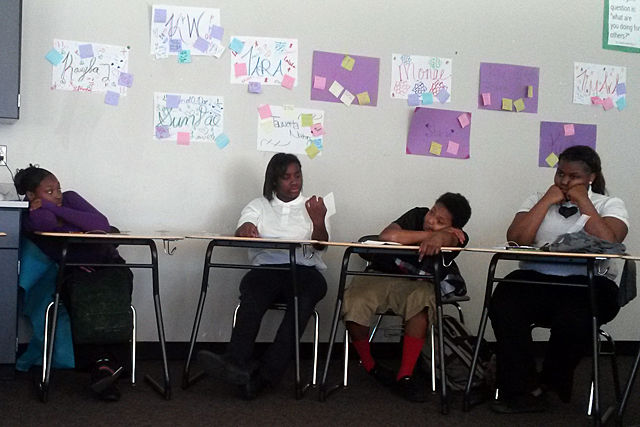At troubled Detroit schools, adjusting to more class time
"(Disclaimer: The state authority receives funding from the Eli Broad and Kellogg foundations, which are among the many supporters of The Hechinger Report.)"
DETROIT ––Many of Malik Canty’s classmates left Southeastern High School of Technology and Law last summer when they discovered the school year would no longer end in June but barrel straight through to August.
Malik, though, could see the value in the new requirement. And he thought his peers at other schools in the city, let loose for the summer while he was still in class, would have been better off sticking it out like he did.
Coming from Detroit Public Schools, the 17-year-old said, “everyone has a lot to make up.”He said he made it through his first 12 years of school reading only one book on his own, “Percy Jackson and the Titan’s Curse.” He’ll be up to two by his August graduation.

Students at Southeastern High School of Technology and Law in Detroit discuss their self-esteem during the daily advisory period. The school is using its expanded learning time to address social and emotional issues through group discussions. (Photo: Sarah Butrymowicz)
Southeastern is one of 15 failing schools in Detroit that were wrested from local control and turned over to the state to manage in the fall of 2012. More time in school ––24 minutes more a day and 35 additional days a year ––was just one of the strategies brought in for an attempted transformation. A closer look at those strategies shows just how difficult it will be to revive some of the most troubled schools in one of the nation’s most troubled cities.
The 15 Detroit schools joined a national movement to help poor students catch up by adding class hours. With most students learning several years behind grade level, administrators at the state authority’s schools say extra time is desperately needed –– and not only for academics. Southeastern is using its additional daily minutes to help meet students’ social and emotional needs, which the staff views as critical for learning to occur, and this allocation of time will be set by individual advisors.
But the school has fewer students to educate now: Jeff Maxwell, who recently resigned as principal after two years, said the longer year played a major role in Southeastern losing nearly 400 students –– half its enrollment –– between the 2012-13 and 2013-14 academic years. About 200 of those students dropped out, according to state data. Others transferred elsewhere.
In a city still reeling from the recession and mortgage crisis that accelerated its decline, even critics of the state takeover agree that a radical overhaul of education is needed. Yet they question the merits of added learning time when, as they see it, quality teaching and learning isn’t happening in the first place.
“I don’t necessarily have a problem with year-round schools; I just don’t think that in and of itself is a solution,”said Chris Savage, community activist and author of the Eclectablog, which has served as a watchdog to the state control. “A year-round school in a sound program is a great idea.…They need to At troubled Detroit schools, adjusting to more class time | The Hechinger Report:
